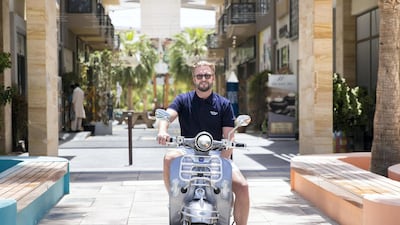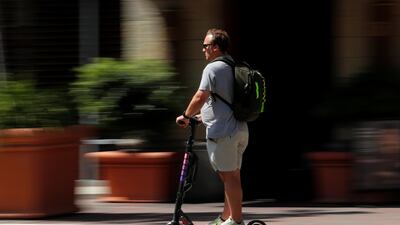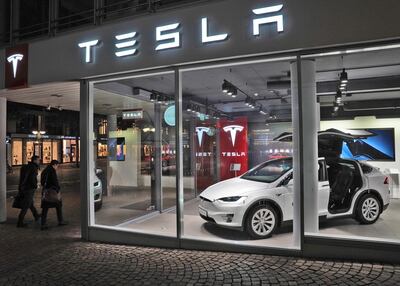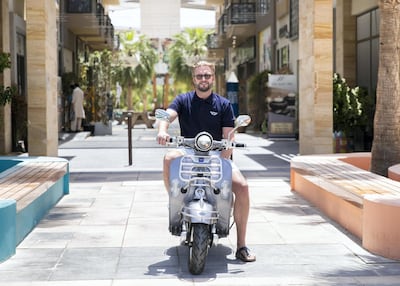Dubai has the potential to become a major user of electric vehicles – if it can overcome certain challenges, leading experts have said.
With more manufacturers committing to a future free from the petrol-powered vehicles, the options are becoming more accessible and affordable.
The recent Digital Life Index report by Publicis Sapient, a digital business transformation company, revealed 82 per cent of potential buyers in UAE would consider an EV, rising to 90 per cent for a hybrid.
While it indicates a strong demand, industry experts said there are challenges – and certain myths – to overcome before consumers 'go electric'.
Concerns remain regarding long charging times, a lack of charging points and the perception that electric cars are too expensive for average earners.
“While the cost of EVs is rapidly dropping, there's still some way to go before it reaches an equilibrium with internal combustion engine (ICE) cars,” said Adam Whitnall, chief executive of car comparison website Drive Ninja.
“Until it reaches the point where you can buy an EV for a similar price, then we won't see mass-market adoption.
“There's also still a lot that needs to be done in terms of infrastructure.
"While residents who live in villas are able to install charging points at home, those who live in apartments are forced to rely on the public charging infrastructure, which is inconsistent and not yet readily available enough to cope with a mass shift to EVs.”
Management consultancy Afry, in a report last year on EVs in the UAE, said costs are close to parity with conventional alternatives when factoring in the savings in fuel costs.
Comparing overall costs, including purchase cost, maintenance/insurance and electricity fuel costs, the Tesla 3 performance model costs $0.45 per kilometre – the same as a petrol-powered Lexus ES. The Tesla 3 standard model costs $0.33 per kilometre, slightly higher than a Honda Accord, which costs $0.25 per kilometre.
At the budget end of the scale, Afry said the electric Renault Zoe costs $0.29 per kilometre, compared to a Nissan Micra, which costs $0.15 per kilometre.
In cash terms, a Tesla 3 starts at about Dh160,000, rising to Dh190,000 for a long-range model. That's similar to the Dh205,000 starting price for a petrol Lexus ES .
A Zoe starts at Dh137,000 - regarded as steep for its tiny size.
The amount of time it took to charge an EV was another concern for motorists thinking of making the switch from petrol engines.
Tackling 'range anxiety'
A Tesla supercharger station can provide an 80 per cent charge in 30 minutes, according to Mr Whitnall. However, that is very much an exception.
“The majority of charging stations don't have the same capability, meaning some cars can take upward of eight hours to be fully charged,” he said.
“Charging times remain a challenge for EV owners. However, most owners quickly adapt their habits to ensure their vehicles are charged when they need them.
“Those who have the luxury of being able to charge at home will not face many issues, and the public charging infrastructure is slowly becoming more viable for those who can't charge at home.”
Another common concern with an EV is 'range anxiety' - running out of juice between charging stations.
“There are hundreds of charging stations across Dubai and the wider UAE, a large number of which are free,” he said.
“Discovering which charging stations are convenient, and the process involved to use each one is a learning experience for every new EV owner in the UAE, but one that is quickly mastered.”
Dubai's Roads and Transport authority introduced a number of initiatives to encourage greater use of EVs, one of which was last year's announcement of free parking in the emirate in designated areas.
The RTA also announced in 2019 that 90 per cent of private taxis must be hybrid or electric by 2026.
Another milestone was reached when the UAE’s first electric bus took to the roads of Abu Dhabi in 2019.
It was also mandated at least 30 per cent of public sector vehicles must be electric or hybrid by the end of the decade, as well as 10 per cent of all vehicles sold in Dubai.
The RTA recorded 1,841 EVs on Dubai roads by the end of 2019, with hybrid and electric vehicles making up 0.44 per cent of all registered vehicles.
That compared to 4.6 per cent of vehicles in California and 1.3 per cent of those registered in London.
However, Mr Whitnall was among those who believed the message about EVs was starting to get through.
“There are already more EVs available in the market than most people realise,” he said.
“Brands such as Mercedes-Benz, MG, and Porsche have recently started showcasing their first EVs in the region, joining brands such as Tesla, Renault, and Chevrolet which have sold electric vehicles here for a few years now.
“Toyota and Lexus have also significantly expanded the amount of hybrid-electric vehicles in their range.”
Mr Whitnall was quick to allay fears that EVs would require complicated and expensive repair work.
“EVs are still new enough that the maintenance network exists largely within the dealerships for now,” he said.
“Over the coming years, as the first EVs start to exit their warranty periods, we will see more third-party service centres adapt to be able to service them.
“EVs have far less moving parts than ICE vehicles, with far simpler electric motors, powered by increasingly sophisticated battery set-ups.”
Commercial interest gradually grows
Kevin Chalhoub, founder and chief executive of EV Lab, a Dubai-based firm that specialises in the distribution of electric vehicles, said the emirate already had what was needed to become a global leader in the sector.
"There is no doubt that Dubai could be the very first in the world to have 100 per cent adoption of EVs and renewable energy cars," he said.
“That is not an unrealistic target for Dubai."
Mr Chalhoub said the level of sales would only continue to grow as people began to realise the benefits of electric and hybrid vehicles.
“Attitudes are changing. We are at a tipping point now. Now when I drive my old non-electric car it feels like I am riding a horse when the car was first invented.”
Prices would only continue to drop as more vehicles were sold.
A brand new Fiat 500E which is available to buy in Dubai for Dh70,000 compared to the petrol model - which cost Dh62,500.
Free or cheap charging, rather than Dh100-plus every few days in the gas station, would lead to significant savings in the long term.
The Covid-19 pandemic has also served to sharpen minds about the potential saving from not having to use petrol to refuel vehicles, according to Adam Ridgway, founder of Dubai-based electric bike company One Moto.
He said the need to keep losses to a minimum during the pandemic has meant that delivery firms in the region were finally embracing the EV sector.
“Transportation is around 40 per cent of the total cost of deliveries,” said Mr Ridgway.
“While not all companies have a mandate to protect the environment, they do all have a mandate for profitability.
“They are starting to realise EVs can save them money on servicing and fuel costs.”
Mr Ridgway said his company has dozens of electric bikes being used by Dubai delivery firms, all of which were launched during the pandemic.
He predicted EVs would represent 10 per cent of delivery vehicles by the end of 2021.








